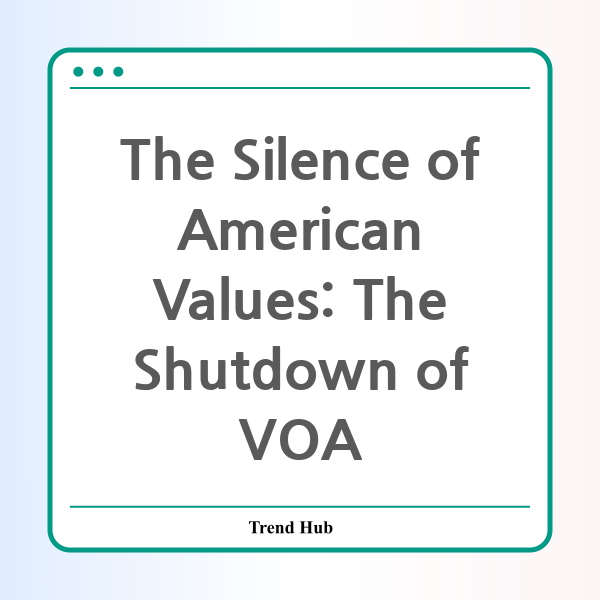* This website participates in the Amazon Affiliate Program and earns from qualifying purchases.

Have you ever wondered about the role of international broadcasters in shaping perceptions of democracy and freedom around the world? Recently, a significant event unfolded that has raised concerns about press freedom and the dissemination of accurate information globally. The Voice of America (VOA), a long-standing institution founded in 1942 to provide objective news and counter propaganda, found itself in a precarious situation, with its operations abruptly halted.
For decades, VOA has served as a vital source of news for millions, delivering content in various languages to audiences across the globe. This broadcaster was not just about reporting facts; it was about presenting American values of truth, transparency, and accountability. When a recent executive order led to the suspension of over one thousand employees, the implications were profound—not only for the network itself but for the global audience that relies on it for trustworthy information.
Many may question the relevance of international broadcasting in today’s digital age dominated by social media and instant news. However, the significant investments made by countries like China in developing their broadcasting capabilities highlight the ongoing need for dependable international news services. In an era where misinformation is rampant, platforms like VOA provide a counter-narrative, showcasing the realities of life in America and holding the government accountable.
The fallout from the executive action has been immediate. Suddenly, millions of listeners and viewers were left without a crucial information source. Historical precedents remind us that during times of crisis, independent journalism serves as a beacon of truth. The silencing of VOA not only risks leaving a void in the U.S. narrative but also empowers authoritarian regimes that thrive on falsehoods and propaganda.
Consider what happened when VOA first began broadcasting amidst World War II—a mission to counteract Nazi propaganda. Fast forward to the Cold War, and we see how vital their reporting was in shining a light on the realities behind the Iron Curtain. This legacy underscores the unique responsibility that such organizations hold in promoting democracy and freedom of expression. With recent shutdowns, the very essence of this mission has been jeopardized, raising pressing questions about the future of free journalism.
As the world becomes increasingly interconnected, the ability to share and receive accurate information is paramount. The recent developments surrounding VOA serve as a stark reminder of the delicate balance between governance and the freedom of the press. The fear is that if a fundamental institution dedicated to objective reporting can be silenced, what does that mean for other forms of media — and for free expression overall?
Organizations that have traditionally supported VOA, across the political spectrum, are beginning to voice their concerns. Lawmakers emphasize the importance of maintaining a free and independent media landscape, especially as global adversaries exploit any opportunity to spread misinformation. This situation begs the question: who will fill the void left by a diminished American presence in international broadcasting?
As the future of VOA remains uncertain, its supporters continue to advocate for the restoration of its mission and operations. A lawsuit has been filed in hopes of reviving this crucial voice of American values. Regardless of political affiliation, there is a tidal wave of concern over the implications that a diminished journalist workforce could bring to global awareness and understanding.
In conclusion, the shutdown of VOA is not merely a domestic issue; it is an international concern that could impact how millions receive information about the U.S. and its policies. As we navigate this complicated landscape, fostering dialogue about the role of media and the importance of factual reporting becomes ever more critical. The fight for press freedom is not just about the press; it’s about the right to access vital information that informs citizens and shapes lives.
* This website participates in the Amazon Affiliate Program and earns from qualifying purchases.